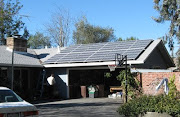Our current Govt states:
‘There is no greater challenge now facing our world and our nation than dangerous climate change. Australia is on the front line to suffer the impacts of climate change as a result of our increasing water scarcity, finely balanced natural environment and our large resources and energy sector. Yet Australia also has the potential to become a world leader in the fast-growing technologies and industries that will enable economies to reduce their carbon emissions.
The cost of inaction on climate change will be much greater than the cost of taking action now. The Australian Government is committed to decisive action on climate change, to prepare Australia for the transformation of the global economy to low carbon energy sources.
The Government’s action plan on climate change includes:
. Establishing a national emissions trading market by 2010 – to enable the market to
set a price for carbon, unleash innovation and create strong market incentives to
reduce carbon emission levels.
. Implementing the Kyoto Protocol and strong support for a new global climate change
agreement to take us beyond 2012.
. Establishing a national emissions trading scheme by 2010.
. Investing in low carbon technologies such as clean coal and renewables.
. Setting a 20 per cent target for renewable energy by 2020 to dramatically expand
the use of renewable energy sources such as solar and wind.
. Implementing a $200 million Great Barrier Reef Rescue Plan to help secure the Reef
from the serious threat posed by climate change and declining water quality.
20% renewable energy target
Reducing greenhouse gas emissions is one of the major challenges in tackling climate change. The Government is implementing a 20 per cent Renewable Energy Target for Australia to reach by 2020 – so that by 2020 renewable energy sources will produce enough energy to meet the energy needs of all Australian households. This will help fast-track the development of new renewable technologies, such as solar, wind and geothermal energy, also known as hot dry rock technology, and help to achieve overall emission reductions at lower cost. ‘
http://www.pm.gov.au/topics/climate.cfm
If The House of Representatives is one of the two houses of the Australian Federal Parliament, the other being the Senate. It is sometimes called the 'people's house' or the 'house of government'. And one of its functions is it ‘Represents the people—Members may present petitions from citizens and raise citizens' concerns and grievances in debate. Members also raise issues of concern with Ministers and government departments.’
Then what are they doing? It is evident they recognize the benefits of Renewable Energy technologies and the fact they will achieve overall emission reductions at a lower cost, and yet they aim for implementing a 20% Renewable Energy Target by 2020. This is a classic case of ‘too little, too late’.
They should be aiming at an 80% Renewable Energy Target by 2020, and start implementing NOW. This, as the Government so rightly states will reduce emissions at a lower cost. It has number of ongoing effects i.e. these sensible approaches will assist schools to produce part of their own funding through electricity generation and on-selling, during school holidays.
When are they going to see the light, this idea is unworkable, and unpopular. They need to work on plans to actively address the issue, rather than boost their tax revenues.
The Means Test was such a backward step for the Solar Energy debate, it is unbelievable that anyone could even have thought of it, let alone suggested and implemented it. You need incentives for people that have the money to install these Solar systems, because if these people take up the incentives then the price of these Solar systems come down, which in turn become more affordable to people in the lower income bracket to be able to purchase them, (it's a no-brainer isn't it). Therefore the Senate Committee should recommend abolish the Means Test.
Fighting against and reducing Carbon Emissions is in fact the easy part, the real challenge is in finding enough politicians that care enough about the issue and their constituents to tackle this issue head-on. We need politicians, that are willing to take the radical solutions onboard and realise it is worth the expense to have people convert their lifestyles and homes and embrace alternate renewable energy resources, and vehicles with 'Greener' emissions.
A concerted Government effort to assist business to convert their energy resources to Solar would be further improving the situation and end up saving business costs in the long term. Schools could be big winners through solar conversion, as besides a saving in general terms, during holiday periods they would have the opportunity to make money by allowing the electric suppliers to buy back electricity the generate and are not using during this period.
And of course the conversion of all residential properties to solar energy as mentioned in my previous Blog has enormous effect on Carbon Emission reduction and offset.
The Carbon Emissions Trading Scheme, which the Rudd Government are presently opting for, due to debatable success in Europe, is a poor choice for Australia, and our unique conditions, and will not really address our problems. The Government is floundering yet again their ‘Grand Design’, as it is not a viable solution in Australia.
See http://www.theaustralian.news.com.au/story/0,,24264595-2702,00.html
The Government should also encourage people to purchase electric bikes and scooters, without a need for license and registration for vehicles up to 500w or 750w motors. (The key consideration will be safety measures such as helmet, or even knee and elbow pads as currently exist) Once again it will reduce emissions, and will force the petrol companies to reduce petrol prices due to the reduction in demand. This will then have an ongoing effect with other supplies such as food etc due to reduced petrol costs.Further emission savings could be achieved with discount in registration costs for vehicles using cleaner solutions such as Electric, LPG or Diesel. Although the Government will need to ensure some form of regulation to keep the sale price of these fuels steady, at least initially. This will result in an increase in greener vehicles being sold as they will be far more attractive in terms of their ongoing costs.
A matter for serious consideration should be closing our city centers to general traffic, by closing the city between 8.00 - 7.00 to private vehicles and introducing a congestion charge with a time restriction on heavy vehicle traffic and deliveries, this will reduce the congestion in the city, and alleviate the carbon emissions produced by vehicles that can only travel at a snails pace there anyway. This would allow city workers to use the current public transport arrangements, bicycles, e-bikes, scooters, and even roller blades safely, leading to not only reduced carbon emissions, but would show an improvement in the health and fitness of many of these workers.They will need to spend to upgrade our public transport also, and teach drivers of buses to drive more economically also., they could actually allow people in the city to use electric bikes and scooters safely, bicycles, scooters and even roller blades safely, and make walking around the city easier to accomplish and less hazardous, which can increase the health and fitness of these workers while reducing Carbon emissions at the same time. Delivery vehicles could be limited to times outside of 8.00 to 7.00.
A Personal rapid transit (PRT) system, also called personal automated transport (PAT) or podcar, is a public transportation concept that offers on-demand non-stop transportation, using small, independent vehicles on a network of specially-built guide-ways. Several different designs have been proposed, and as of 2008, at least one is under construction. This ideally could be utilized to travel around the city initially, and then expanding the network to other areas. Another option would be to expand the current Sydney Monorail and Metro Light Rail to encompass the CBD.
As we have a train link to the airport, the issue of people needing taxis to the airport is already addressed and by upgrading public transport facilities, will be better accepted and utilized.
These ideas would be an easy sell on the electorate, they are a sign of Australia’s ‘coming of age’ to the International Community on the proactive approach to Climate Change, and a radical change in the political scene by showing Government’s don’t just feel our pain, but are willing to address the cause of our problems, and take action to implement the necessary changes, with the aim to improve the quality of life of all Australians and this wonderful country.
A Government with a strong leader in place, who is willing to show they are focused on Australia, and the electorate, rather than their own political future, could bring forward these changes and ensure policies, that are against the electorates’ needs or desires and are fundamentally flawed are not introduced.
It only requires politicians willing to accept they may upset a few big businesses, (although the abolishment of the Emissions Trading Scheme, will appease a lot of these) for the benefit of all Australians, and show a willingness to make and change some existing legislation, policies and plans, to address these important needs, and we as Australians will be showing the world not just ‘the way of the future’, but also 'the way forward'
Kevin
Saturday, August 30, 2008
Is the Government only paying Lip Service to Climate Change?
Labels:
Alternative,
Australia,
Australians,
climate,
climate change,
Ebikes,
Emissions,
Energy,
Environment,
Global Warming,
Green,
petrol,
politician,
Renewables,
solar,
traffic
Subscribe to:
Post Comments (Atom)










No comments:
Post a Comment